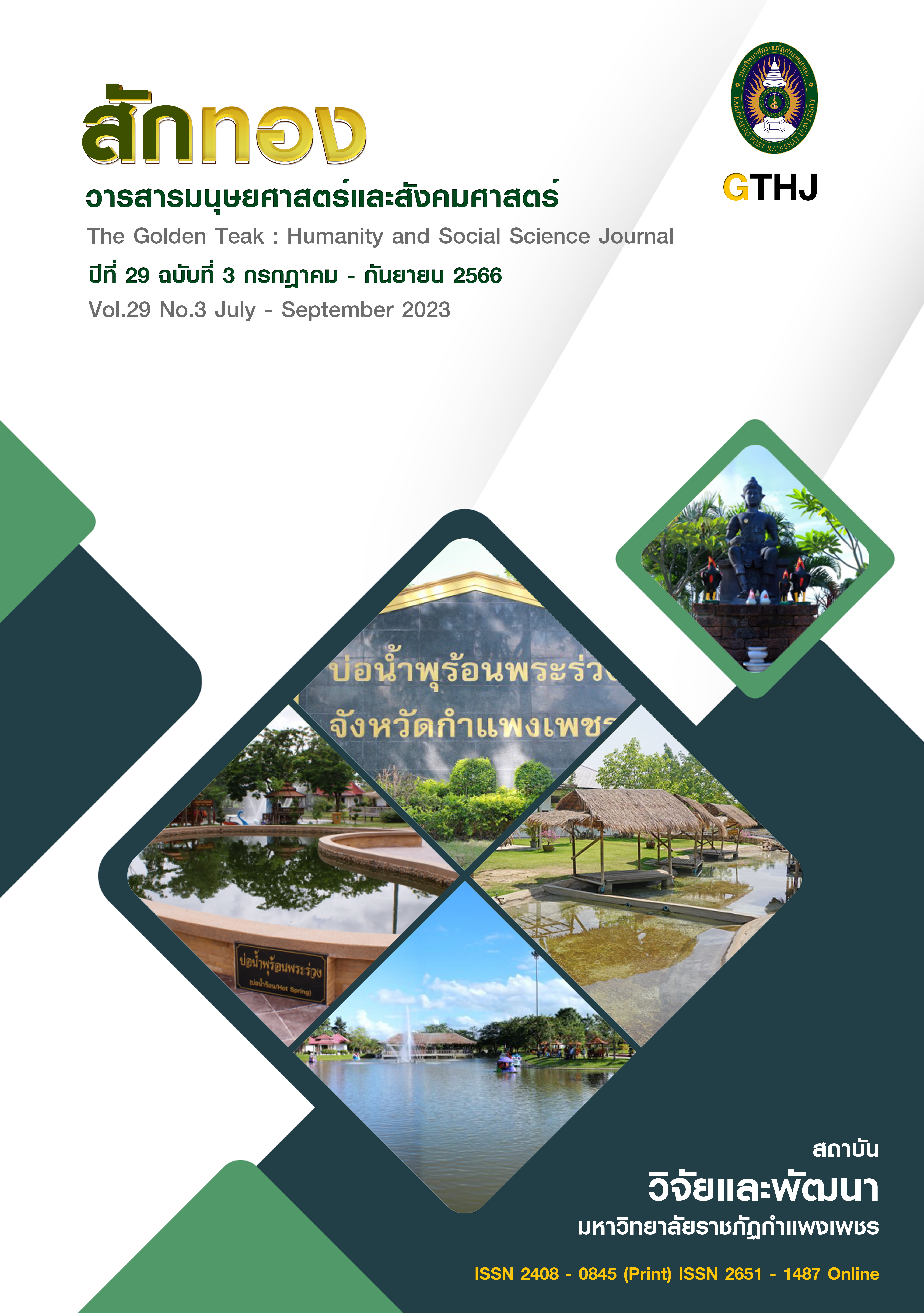Kindergarten Teachers and the Development of Decision-making Intelligence in Early Childhood
Main Article Content
Abstract
Decision-making intelligence is one of the foundations of thinking skills every preschool child should possess. This is because it is the ability to choose the best and most beneficial option to take an action in the face of a particularly problematic situation, an emergency or an accident. To choose to act quickly requires decision-making intelligence. The decision-making intelligence must be developed in conjunction with the work of the brain or the frontal brain, known as the Executive Function (EF), which also refers as CEO of the brain. Enhancing brain skills is therefore essential in enhancing the decision-making intelligence of early childhood children under the EF Brain Skills concept, as it cannot occur naturally but depends on proper training and enhancing. Therefore, the management of learning experiences for early childhood is an important part in enhancing children's decision-making intelligence by emphasizing a variety of learning experiences which emphasizing on allowing children to learn through direct experience, take action, and events encountered in daily life. Thus, the Phenomenon-based learning experience is a method that can be used to develop the decision-making intelligence of early childhood through media and innovative technologies that are adapted to the changing todays’ World. It takes into account the principles and integration that do not focus on content or memorization to enable early childhood making smart decisions which focus on the development of consciousness, awareness, acceptance, and willingness to act, including being able to apply appropriately used in each situation.
Article Details

This work is licensed under a Creative Commons Attribution-NonCommercial-NoDerivatives 4.0 International License.
บทความที่ได้รับการตีพิมพ์เป็นลิขสิทธิ์ของวารสาร สักทอง : วารสารมนุษยศาสตร์และสังคมศาสตร์ สถาบันวิจัยและพัฒนา มหาวิทยาลับราชภัฏกำแพงเพชร
ข้อคิดเห็นใดๆ ที่ปรากฎในวารสารเป็นวรรณกรรมของผู้เขียนโดยเฉพาะ ซึ่งมหาวิทยาลัยราชภัฏกำแพงเพชรและบรรณาธิการไม่จำเป็นต้องเห็นด้วย
References
Barth, R.P. (1992). Child sexual abuse prevention: Research review and recommendations. Social Work Research and Abstracts, 28(4), 6-15.
Center on the Developing Child. (2015). Activities Guide : Enhancing and Practicing ExecutiveFunction Skills with Children from Infancy to Adolescence. [Online]. Available : https://developingchild.harvard.edu [2022, Mach 1].
Gardner, H. (2013). Frequently asked questions—Multiple intelligences and related educational topics. [Online]. Available : https://www.wtc.ie/images/pdf/ Multiple_Intelligence/mi15.pdf [2022, Mach 22].
Himle, M.B. Miltenberger, R.G., Flessner, C. & Gatheridge, B. (2004). Teaching Safety Skills to Children to prevent gun Play. Journal of Applied Behavior Analysis, 37(1), 1-9.
Jackson, K. & Caffarela, R.S. (1994). Experiential learning: a new approach. San Francisco: Jossy-Bass.
Janis E. Jacobs & Paul A. Klaczynski. (2002). The development of judgment and Decision-making During Childhood and Adolescence. Current Directions in Psychological Science, 11(4), 145-149.
Kolb, D.A. (1984). Experiential Learning: Experience as the Source of Learning and Development. Englewood Cliffs, NJ : Prentice Hall.
Kolb, D.A., Rubin, I.M. & Osland, J. (1991). Individual and organizational learning Organizational Behavior: an experiential approach, New Jersey, Prentice Hall, 58-60.
Worapipat, K. (2012). Problem-based learning. [Online]. Available : https://www.mediathailand.org/2012/05/blog-post_9778.html [2022, Mach 22]. [In Thai]
Mattila, P. & Silander, P. (2015). How to create the school of the future: revolutionary thinking and design from Finland. Finland : Multprint, Oulu.
Miltenberger, G.R. (2008). Teaching Safety Skills to Children: Prevention of Firearm Injury as an Exemplar of Best Practice in Assessment, Training, and Generalization of Safety Skill. Teaching Safety Skills to Children, 1(1), 30-36.
Ministry of Education, Royal Thai Government. (2017). Early Childhood Curriculum B.E. 2560 (A.D.2017). The Federation of Savings and Credit Cooperatives of Bangkok Limited Printing Press, Bangkok. [In Thai]
Newby, Northridge, Rooney, Norrie, Dargiel. (1999). Comparison of the short-term effects of candoxatril, an orally activeneutral endopeptidase inhibitor, and frusemide in the treatment of patients with chronic heart failure. NCBINational Center for Biotechnology.
Mahawijit, P. (2017). Phenomena Learning from Finland. Bangkok : Bookscape. [In Thai]
Chaichaowarat, R. (2022). Phenomenon-Based Learning. [Online]. Available : https://thepotential.org/knowledge/ phenomenon-based-learning/ [2022, April 11]. [In Thai]
Raymond, L.C. & Sally J. Zepeda. (1999). Decision-making Assessment : Improving Principal Performance. International Journal Management, 13(1), 6-13. [In Thai]
Silander, P. (2015). Phenomenon-based learning. [Online]. Available : http://www.phenomenaleducation.info/ phenomenon-based-learning.html [2022, April 5].
Harnmethee, S., Pitaksinsuk, T. & Aramritthi, P. (2018). Handbook for Developing Brain Skills (EF Executive Functions) for Early Childhood Teachers. Bangkok : Ek Pimthai Co., Ltd. [In Thai]
Symeonidis, V. & Schwarz, J.F. (2016). Phenomenon-based teaching and learning through the pedagogical lenses of phenomenology: The recent curriculum reform in Finland. Forum OSwiatowe, 28(2), 31-47. [In Thai]
Tissington, S. (2019). Learning with and through phenomena: An explainer on phenomenon-based learning. http://www.explainer on phenomenon-based learning.info.html [2022, April 17]. [In Thai]


